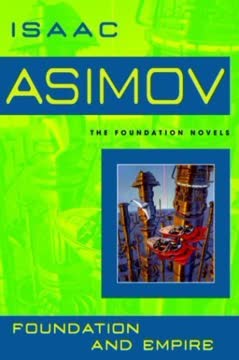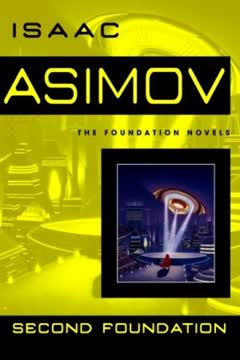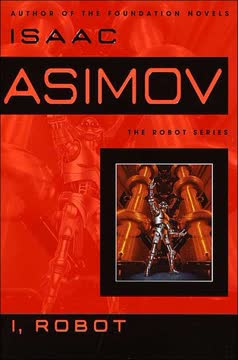Plot Summary
The Fall of Empire
The once-mighty Galactic Empire is in decline, with its vast territories breaking away into independent kingdoms. Amidst this chaos, Hari Seldon, a brilliant psychohistorian, predicts the Empire's fall and establishes the Foundation on the remote planet of Terminus. His goal is to preserve knowledge and shorten the impending dark ages from thirty thousand years to just one thousand, eventually leading to a new Empire.
Seldon's Grand Plan
Seldon's plan involves a series of crises that will force the Foundation to evolve and grow stronger. The first crisis arises when the neighboring kingdoms threaten Terminus. Seldon's holographic message reveals that the Foundation's true purpose is not the Encyclopedia but to become the seed of a new Empire. The Foundation must navigate these crises using the tools of science and trade.
The Rise of Terminus
Under the leadership of Salvor Hardin, the Foundation uses its scientific knowledge to gain influence over the surrounding kingdoms. By providing technological advancements and establishing a religious hierarchy, the Foundation secures its position. Hardin's strategy of non-violence and manipulation of political forces ensures the Foundation's survival and expansion.
Traders and Treachery
As the Foundation grows, traders like Hober Mallow become key players in spreading its influence. Mallow is sent to investigate the disappearance of trade ships and the potential threat of nuclear weapons in the Korellian Republic. He discovers that the Empire still exists and is supplying Korell with advanced technology, posing a significant threat to the Foundation.
The Power of Trade
Mallow realizes that trade and economics not religion, is the key to controlling the Periphery. By establishing economic dependencies, he ensures that the Foundation's technology becomes indispensable. Mallow's approach shifts the Foundation's strategy from religious control to economic dominance, setting the stage for future crises.
Crisis and Control
Mallow faces opposition from within the Foundation, as political factions vie for power. He must navigate these internal threats while preparing for the external danger posed by the Empire's resurgence. Mallow's leadership and strategic acumen are crucial in maintaining the Foundation's stability and ensuring its continued growth.
The Merchant Prince
Hober Mallow's success as a trader and leader earns him the title of the first Merchant Prince. His economic policies strengthen the Foundation, but new challenges loom on the horizon. The Foundation must continue to adapt and evolve, guided by Seldon's plan, to eventually become the nucleus of a new Galactic Empire.
Characters
Hari Seldon
Seldon is the architect of the Foundation, using his science of psychohistory to predict and guide the future. His plan involves a series of crises that will shape the Foundation into the seed of a new Empire. Seldon's foresight and strategic genius are central to the narrative.
Salvor Hardin
Hardin is the first mayor of Terminus and a master of political strategy. He uses non-violence and manipulation to navigate the Foundation through its early crises, ensuring its survival and growth. Hardin's leadership sets the stage for the Foundation's expansion.
Hober Mallow
Mallow is a Master Trader who becomes a key figure in the Foundation's expansion. He shifts the focus from religious control to economic dominance, using trade and economics to establish dependencies. Mallow's success earns him the title of Merchant Prince, and his legacy shapes the Foundation's future.
Jorane Sutt
Sutt is a high-ranking official within the Foundation who opposes Mallow's methods. He represents the old guard, favoring religious control over economic strategies. Sutt's opposition creates internal conflict within the Foundation.
Anselm haut Rodric
Rodric is a representative of the Anacreonian kingdom, involved in negotiations with the Foundation. His interactions with Hardin highlight the political tensions and maneuvering that characterize the Foundation's early years.
Poly Verisof
Verisof serves as the Foundation's ambassador to Anacreon, navigating the complex religious and political landscape. His role underscores the importance of religion in the Foundation's early strategy.
Commdor Asper
Asper is the leader of the Korellian Republic, a key player in the conflict with the Foundation. His alliance with the remnants of the Empire poses a significant threat to the Foundation's stability.
Plot Devices
Psychohistory
Psychohistory is the science developed by Hari Seldon to predict and guide the future of large populations. It is the foundation of Seldon's plan, ensuring that the Foundation evolves through a series of crises to eventually become the nucleus of a new Empire.
Seldon Crises
The Seldon Crises are pivotal moments in the Foundation's history, designed to force it to adapt and grow stronger. Each crisis presents a unique challenge that the Foundation must overcome, shaping its development and ensuring its survival.
Trade and Economics
Trade becomes a central strategy for the Foundation, as economic dependencies are established with surrounding kingdoms. This shift from religious control to economic dominance is key to the Foundation's expansion and influence.
Analysis
Isaac Asimov's "Foundation" explores themes of power, control, and the cyclical nature of history. The narrative highlights the importance of adaptability and strategic thinking in the face of changing circumstances. Asimov's vision of a future guided by science and reason remains relevant, offering insights into the complexities of human society and the potential for progress. The Foundation's journey from a small scientific outpost to the seed of a new Empire underscores the transformative power of knowledge and the enduring quest for a better future.
Last updated:
FAQ
Synopsis & Basic Details
What is Foundation about?
- Galactic Empire's Decline: Foundation chronicles the fall of a vast Galactic Empire and the efforts to mitigate the ensuing dark age.
- Psychohistory's Prediction: Hari Seldon uses psychohistory to foresee the Empire's collapse and establishes the Foundation to shorten the dark age.
- Foundation's Evolution: The story follows the Foundation's journey through a series of crises, as it evolves from a scientific outpost to a potential new empire.
Why should I read Foundation?
- Epic Scope and Vision: Foundation offers a grand narrative spanning centuries, exploring the rise and fall of civilizations.
- Intriguing Themes: The novel delves into complex themes of history, power, and the influence of science on society.
- Thought-Provoking Ideas: Asimov's work presents a unique blend of science fiction and social commentary, prompting readers to consider the nature of progress and control.
What is the background of Foundation?
- Galactic Empire Setting: The story is set in a future where a vast Galactic Empire, spanning millions of worlds, is in decline.
- Psychohistory as Science: The concept of psychohistory, a statistical science predicting the behavior of large populations, is central to the plot.
- Foundation's Purpose: The Foundation is established as a refuge for knowledge and a catalyst for a new civilization, amidst the chaos of the Empire's fall.
What are the most memorable quotes in Foundation?
- "Violence is the last refuge of the incompetent.": This quote, attributed to Salvor Hardin, encapsulates a key theme of the novel, emphasizing the importance of strategy over brute force.
- "Scientific truth is beyond loyalty and disloyalty.": Hari Seldon's statement highlights the objective nature of science and its separation from political agendas.
- "The fall of Empire, gentlemen, is a massive thing... and it is too majestic and massive a movement to stop.": Seldon's words underscore the inevitability of the Empire's decline, a central tenet of psychohistory.
What writing style, narrative choices, and literary techniques does Isaac Asimov use?
- Focus on Ideas: Asimov prioritizes the exploration of ideas and concepts over character development or action sequences.
- Episodic Structure: The novel is structured as a series of interconnected stories, each focusing on a different crisis and period in the Foundation's history.
- Encyclopedic Tone: Asimov often uses an encyclopedic tone, providing background information and historical context through excerpts from the fictional Encyclopedia Galactica.
Hidden Details & Subtle Connections
What are some minor details that add significant meaning?
- Trantor's Urbanization: The description of Trantor as a planet-wide city highlights the Empire's over-reliance on a single administrative center, making it vulnerable.
- The "Sun Room": The artificial "Sun Room" in the Luxor Hotel symbolizes Trantor's detachment from nature and its dependence on technology.
- Jerril's Slyness: Jerril's seemingly casual conversation with Gaal on the observation tower reveals the pervasive surveillance and paranoia within the Empire.
What are some subtle foreshadowing and callbacks?
- Seldon's "Raven" Nickname: Jerril's reference to Hari Seldon as "Raven" foreshadows the negative perception of his predictions and the impending doom.
- The Observation Tower: Gaal's initial disappointment at not seeing Trantor from space is a subtle foreshadowing of the planet's hidden depths and the lack of open spaces.
- The Recorder's Blanketing: Lors Avakim's recorder that blanks spy beams foreshadows the Foundation's ability to manipulate and control information.
What are some unexpected character connections?
- Jord Fara's Psychology: Fara's seemingly simple-minded comments about the Vault reveal a deeper understanding of Seldon's psychology, hinting at a hidden purpose.
- Avakim's Role: Lors Avakim's appearance as Seldon's lawyer highlights the psychohistorian's meticulous planning, even in seemingly minor events.
- Jaim Twer's Betrayal: Twer's role as a spy for Sutt reveals the internal conflicts and power struggles within the Foundation.
Who are the most significant supporting characters?
- Yohan Lee: As Salvor Hardin's loyal aide, Lee represents the practical and pragmatic side of the Foundation's leadership.
- Poly Verisof: As the Foundation's ambassador to Anacreon, Verisof highlights the complex interplay of religion and politics in the Foundation's strategy.
- Ankor Jael: As a former politician, Jael provides a critical perspective on the Foundation's internal dynamics and the challenges of maintaining power.
Psychological, Emotional, & Relational Analysis
What are some unspoken motivations of the characters?
- Seldon's Self-Sacrifice: Seldon's willingness to accept exile and death reveals his deep commitment to the long-term goals of psychohistory.
- Hardin's Weariness: Hardin's growing weariness and cynicism suggest a burden of leadership and a disillusionment with the Foundation's ideals.
- Wienis's Ambition: Wienis's desire for power and control drives his actions, revealing a deep-seated insecurity and a need for validation.
What psychological complexities do the characters exhibit?
- Pirenne's Obsession: Pirenne's single-minded focus on the Encyclopedia reveals a rigid and inflexible personality, ill-suited for political leadership.
- Lepold's Fear: Lepold's fear of the Foundation and his reliance on Wienis highlight his vulnerability and lack of self-confidence.
- Mallow's Detachment: Mallow's detachment and cynicism mask a deep-seated ambition and a desire for control, making him a complex and unpredictable figure.
What are the major emotional turning points?
- Gaal's Arrest: Gaal's arrest and subsequent realization of Seldon's manipulation mark a turning point in his understanding of psychohistory.
- Hardin's Frustration: Hardin's frustration with the Board of Trustees and their obsession with the Encyclopedia leads him to take decisive action.
- Wienis's Defeat: Wienis's realization of his powerlessness and the failure of his plans leads to his violent and desperate actions.
How do relationship dynamics evolve?
- Hardin and Pirenne: The relationship between Hardin and Pirenne evolves from mutual antagonism to a grudging respect, highlighting the clash between political and scientific leadership.
- Mallow and Twer: The relationship between Mallow and Twer shifts from a partnership to a power struggle, revealing the complexities of political alliances.
- Lepold and Wienis: The relationship between Lepold and Wienis is marked by a mix of fear, dependence, and resentment, reflecting the instability of the Anacreonian kingdom.
Interpretation & Debate
Which parts of the story remain ambiguous or open-ended?
- The Second Foundation: The location and nature of the Second Foundation remain a mystery, leaving room for future exploration and speculation.
- The Empire's Fate: The ultimate fate of the Galactic Empire and its potential for resurgence is left open, suggesting a cyclical view of history.
- Seldon's True Intentions: The full extent of Seldon's plan and his motivations remain somewhat ambiguous, inviting readers to question his methods and goals.
What are some debatable, controversial scenes or moments in Foundation?
- Hardin's Manipulation: Hardin's use of religion and political maneuvering raises questions about the ethics of his leadership and the Foundation's methods.
- Mallow's Pragmatism: Mallow's focus on economic power and his willingness to sacrifice individuals for the greater good spark debate about the morality of his actions.
- The Treatment of the Priest: Mallow's decision to hand over the priest to the mob raises questions about the Foundation's commitment to its own ideals.
Foundation Ending Explained: How It Ends & What It Means
- Economic Power Prevails: The end of the "Traders" section sees Mallow using economic power to defeat Korell, highlighting the shift from religious to economic control.
- Seldon's Plan Continues: The story ends with the Foundation's continued progress along Seldon's plan, suggesting that the crises are designed to shape the Foundation's future.
- Uncertain Future: The ending leaves the Foundation's ultimate fate open, emphasizing the ongoing nature of the struggle for power and the challenges of building a new empire.
Review Summary
Foundation is a seminal science fiction work that explores the concept of psychohistory and the fall of a galactic empire. Readers praise Asimov's innovative ideas and storytelling, while noting dated elements and lack of character development. The book's episodic structure follows the Foundation's evolution over centuries, presenting sociopolitical challenges and clever solutions. Many consider it a cornerstone of the genre, though some find the writing style dry and dialogue-heavy. Despite its flaws, Foundation remains influential and thought-provoking.
Foundation (Publication Order) Series Series
Similar Books
Download PDF
Download EPUB
.epub digital book format is ideal for reading ebooks on phones, tablets, and e-readers.




















